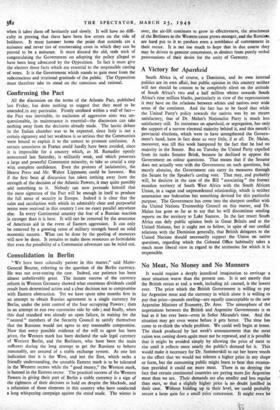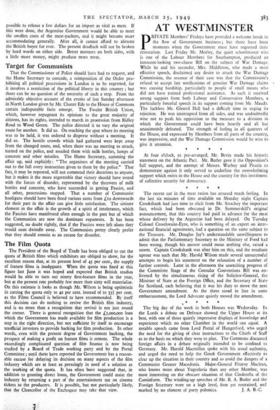No Meat, No Money and No Manners
It would require a deeply jaundiced imagination to envisage a meat situation worse than the present one. It is not merely that the British ration at rod. a week, including ad. canned, is the lowest ever. The price which the British Government is willing to pay for Argentine meat and the currency in which alone it is willing to pay that price—pounds sterling—are equally unacceptable to the new Argentine Minister of Economy, Dr. Ares. The atmosphere of the negotiations between the British and Argentine Governments is as bad as it has ever been—even in Senor Miranda's time. And the situation may get even worse before it gets better. The time has come to re-think the whole problem. We could well begin at home. The shock produced by last week's announcement that the meat ration was coming down again must not be repeated, and it is possible that it might be avoided simply by allowing the price of meat to rise until it reflects more nearly the public's demand for it. This would make it necessary for Dr. Summerskill to eat her brave words to the effect that we would not tolerate a higher price in any shape or form, but the consuming public might learn to bear that recanta- tion provided it could eat more meat. There is no denying the fact that certain continental countries are paying more_for Argentine meat than we are. Their demands are also smaller and less regular than ours, so that a slightly higher price is no doubt justified in their case. Without bidding up to their level, we could probably secure a large gain for a small price concession. It might even be
possible to release a few dollars for an import as vital as meat. If this were done, the Argentine Government would be able to meet the swollen costs of the meat-packers, and it might become more accommodating generally. After all, it cannot afford to alienate the British buyer for ever. The present deadlock will not be broken by hard words on either side. Better manners on both sides, with a little more money, might produce more meat.















































 Previous page
Previous page